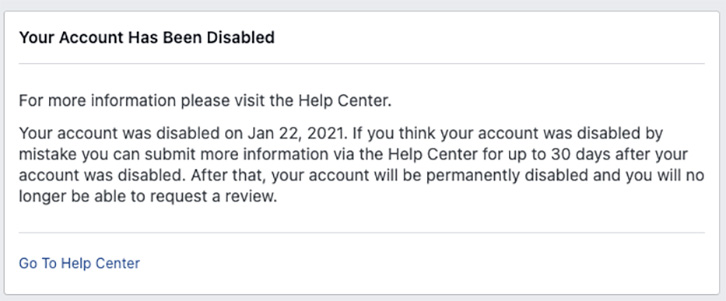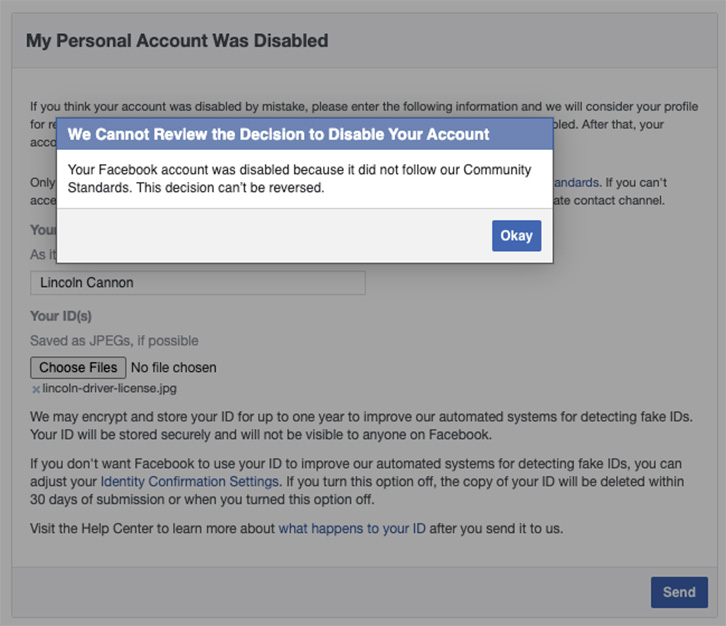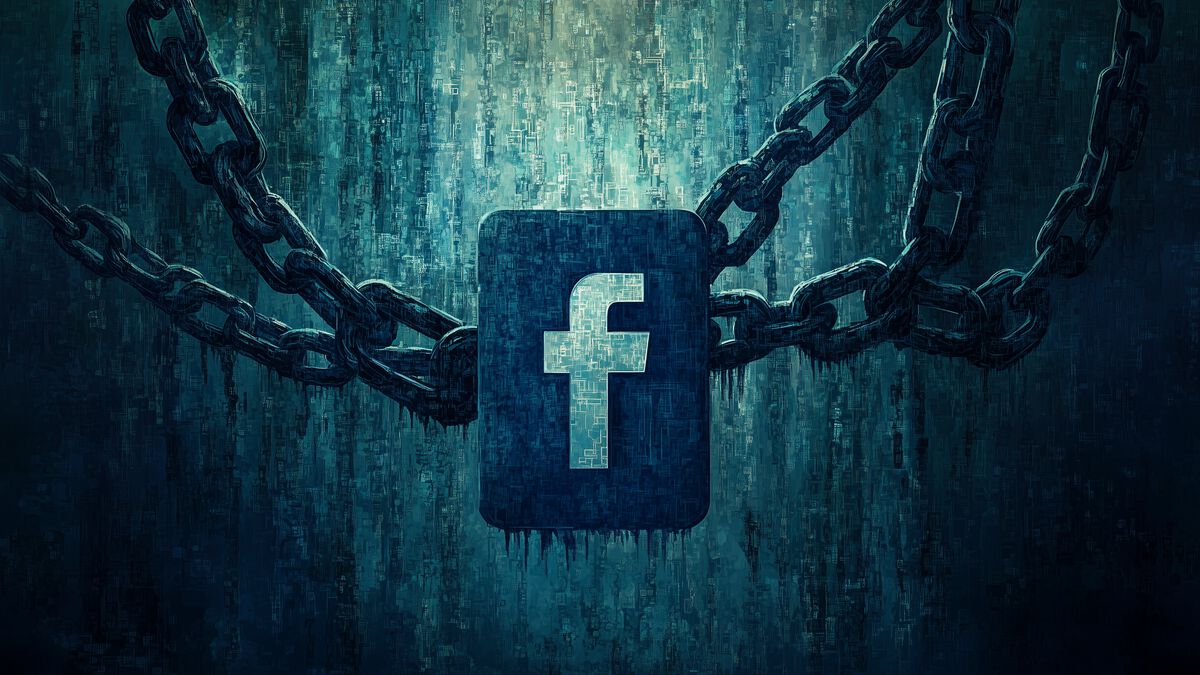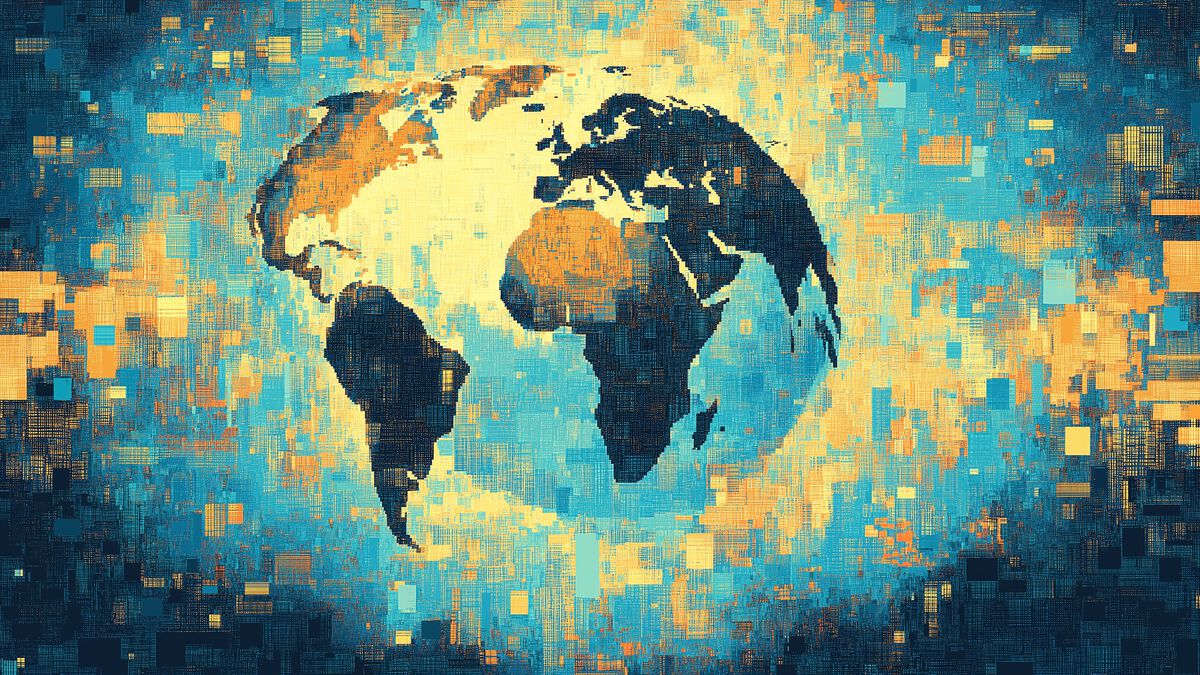Facebook Disabled My Account After I Criticized Them
Lincoln Cannon
22 January 2021 (updated 15 December 2024)
Facebook unfriended me. Why? So far as I can tell, it’s because I’ve been using Facebook to advocate for decentralization of social media. And apparently the algorithm didn’t like that.
This morning, sometime between 8:54am and 9:06am Mountain, Facebook disabled my account. Just after 8:54am, I copy-pasted the content of my latest Twitter post into a new post on Facebook. At 9:06am, a friend received a Facebook notification indicating that he needed to update his trusted contacts because I was no longer available. Here’s the exact text and link that I posted to both Twitter and Facebook:
“Now is the time to build, promote, and adopt decentralized social networks. The future of humanity depends on it. Ben Goertzel gets it right. Read his explanation. https://www.coindesk.com/decentralized-social-networks-next-big-blockchain-opportunity” (22 January 2021)
Now is the time to build, promote, and adopt decentralized social networks. The future of humanity depends on it. Ben Goertzel gets it right. Read his explanation. https://t.co/3DMsYiQdLa
— Lincoln Cannon (@LincolnCannon) January 22, 2021
When my friend’s notification came to my attention, I attempted to access Facebook. I was able to login. But I wasn’t able to see anything except the following message:
“Your Account Has Been Disabled. For more information please visit the Help Center. Your account was disabled on Jan 22, 2021. If you think your account was disabled by mistake you can submit more information via the Help Center for up to 30 days after your account was disabled. After that, your account will be permanently disabled and you will no longer be able to request a review.”

I clicked on a link at the end of the message. It took me to the Help Center. There I found a link to request a review. Clicking on that link took me to a form which requested my full name and photo ID.
I filled out the form, providing my name and a JPG of my government issued ID. Then I submitted the form. In response, I received the following message:
“We Cannot Review the Decision to Disable Your Account. Your Facebook account was disabled because it did not follow our Community Standards. This decision can’t be reversed.”

Why Facebook Disabled My Account
I don’t know for sure why Facebook disabled my account. I didn’t receive an explanation. There was no reference to particular Facebook Community Standards that I might have broken. There was no indication of how I might have been violating Facebook’s terms of service.
Moreover, I have never received a warning from Facebook. And I didn’t receive a warning today. They provided no information beyond what I’ve quoted above.
I’ve never used Facebook or any other social media to advocate violence, political or otherwise. And I’m a political centrist. In fact, during the political controversies of 2020, I repeatedly insisted on civility to such an extent that it frustrated some of my more partisan friends. So we can’t plausibly look for an explanation there.
We could imagine a conspiracy among people who dislike my religious views. There’s plenty of strong anti-Mormon and anti-Transhumanist sentiment out there. Perhaps, banding together, a group of people reported or otherwise flagged my content on Facebook as inappropriate. But this seems a bit paranoid to me.
I don’t think the cause was the link that I shared, in itself. Quite a few other people have shared that link on Facebook. In fact, at this moment, their API indicates that the link has received at least 88 likes, shares, and comments across Facebook. And that number has been increasing throughout the day without Facebook banning others for it, to the best of my knowledge.
So I think the cause must have been the comment itself. Or, more generally, it may have been an emerging pattern in the comments of my posts. For a long time, I have advocated replacing Facebook with decentralized social networks. And current events have motivated me to increase the frequency of that advocacy.
Several times over the last week or two, I have promoted decentralization in posts to both Facebook and Twitter. The content and links of the original posts were identical on the two platforms. So you can see them on my Twitter account. For easy reference, here are copies of my most recent cross-posts in reverse chronological order (as ordered on Twitter and previously on Facebook):
-
“Congratulations to President Biden and Vice-President Harris. May your term in office be peaceful and prosperous, for the United States of America and for our world.” (20 January 2021)
-
“The debate between capitalism and socialism is often framed as a choice between large corporations and large government. This framing is cultivated by political and economic elites. The truth is that there’s an alternative to both. Limit both. Decentralize ALL power.” (20 January 2021)
-
“In a recent discussion with the Christian Transhumanist Association, I presented and answered questions about the New God Argument. Here’s a recording. https://www.youtube.com/watch?v=kCUrUnZavGk&list=PL9Yc4oMKukRkMnBAkXNv9JWApl9D4Qe8j” (18 January 2021)
-
“Decentralization is a practical necessity. For Christians, it’s also a theological mandate. Essential to the Gospel is a transformative discipleship, wherein we each participate in the role of Christ and become joint heirs in the glory of God. Divine creation IS decentralization.” (17 January 2021)
-
“If God ensures the right spirit is associated with the right body during human-mediated procreation, why wouldn’t God ensure the same for human-mediated resurrection? If you build it, they will come. If they don’t come, you didn’t build it right. Seems straightforward to me.” (15 January 2021)
-
“‘The long view is a thriving decentralized marketplace, fueled by personal empowerment and collaboration.’ https://www.nytimes.com/2021/01/10/technology/tim-berners-lee-privacy-internet.html” (11 January 2021)
-
“Let’s say you have enough spare cash to buy a gun, donate to a charity, or invest in some Bitcoin. What do you do and why? What does your choice say about your vision of the future? How does your choice impinge on the creation of that future?” (9 January 2021)
-
“Trump was banned from Facebook and Twitter. That may or may not be comparatively fair. But if it constitutes an infringement on freedom of speech then we’ve given far too much power to Facebook and Twitter. Centrally controlled freedom of speech should terrify us.” (9 January 2021)
In addition, on 13 January 2021, I shared to Facebook some thoughts in support of a tweet from Twitter CEO Jack Dorsey. I can no longer quote the text from my Facebook post because it wasn’t a cross-post like the others. But it essentially affirmed Jack Dorsey’s interest in supporting decentralized social media, as he expressed in a recent tweet:
We are trying to do our part by funding an initiative around an open decentralized standard for social media. Our goal is to be a client of that standard for the public conversation layer of the internet. We call it @bluesky: https://t.co/51or6OuNNv
— jack (@jack) January 14, 2021
As you can see, almost all of my recent social media posts have been related to decentralization. Even the ones that aren’t obviously related to decentralization are still implicitly or indirectly related to decentralization. For example, decentralization is an important aspect of the Compassion Argument of the New God Argument. And a theology that would include human action toward resurrection as an expression of God’s work is a decentralized theology.
A machine learning algorithm would be capable of identifying accounts that publish posts with a pattern of negative sentiment toward centralized social media. The algorithm could also assign a score to the degree of negative sentiment. And Facebook could use that score to trigger automatic deactivation of accounts that surpass a relatively high score. None of this would require direct human intervention.
Again, I don’t know for sure why Facebook deactivated my account. But based on what I know, I think the best explanation is that Facebook now implicitly hates decentralization. I suspect that one of its algorithms is checking for accounts that encourage use of alternative social networks. And it caught my account in its automated net.
As an aside, perhaps some Facebook managers and engineers originally intended the algorithm to catch accounts that encourage use of social networks that focus on controversial politics. That seems possible. I’ve neither advocated for nor participated in those social networks. But I can see how my posts might have some syntactical commonalities with posts that advocate for those social networks.
Why Facebook Doesn’t Ban Everyone
Aren’t other people advocating for decentralized social networks without being banned? Maybe so. But the algorithm may have identified my account as a particularly useful target. Here’s why.
Social network theory categorizes people according to how they function in networks. Some people are influencers within groups of similar persons. Some people are followers within groups. And some people are connectors between groups.
Connectors facilitate transmission of ideas between dissimilar groups. Transmission of ideas can be good, promoting adaptability over time and creation of new value. But transmission of ideas can also be bad insofar as they undermine the coherence and survival of the group or system. All groups and systems, even the most creative, require a balance.
As it turns out, my social connections are unusually diverse. For example, I have many politically progressive and many politically conservative connections. I have many religious, secular, and atheist connections. And these connections include many influencers in a wide variety of geographies around the world.
I’m a connector. I integrate ideas from one group into another. And while everyone may do that to some extent. I do it far more than most people.
So keep in mind these two factors. First, I’ve been increasingly engaged in advocating decentralization, which would entail the end of Facebook as we know it. And second, I’m a relatively effective connector. Together, these factors make me an excellent target for a Facebook self-preservation algorithm.
Say you want to minimize growth of interest in decentralization. And say you want to do that while also deactivating the fewest accounts possible, so as to raise the least overall concern possible. No matter how you go about doing this, you’ll raise some concern. But you can probably achieve an optimal balance by targeting people like Lincoln Cannon.
If I’m right, Facebook disables other accounts like mine. We should expect them to target other people who function as connectors and promote decentralization. And I think we may indeed be seeing that. Here’s an example, also from today.
Ii was just bounced by Facebook. Haven't a clue why. Nothing particularly provocative of late other than campaigning for free speech on the nets in a clear dispassionate way. What is WRONG with those people! pic.twitter.com/djOwVkfRtp
— Jim Rutt (@jim_rutt) January 22, 2021
Harm from Facebook
This is a complex situation for me. On the one hand, I favor the eventual dissolution (or at least decentralized transformation) of Facebook. On the other hand, like many people, I received value from using it. And I had intentionally chosen to continue using it for that value despite my concerns.
Now I’ve lost practical access to 15 years worth of live personal data. It represented extensive interactions with friends, family, and other acquaintances. I have backups. But those aren’t practical or complete, and can’t take the place of live data.
I’ve also lost direct access to numerous business and non-profit functions. They include Facebook pages, groups, advertising accounts, application configurations, and more. They belong to my own businesses, businesses for which I work as a consultant, and non-profits to which I provide volunteer service. Fortunately, there are other people who can still access all of these things on my behalf, although that still poses significant challenges.
I imagine that most people in my situation wouldn’t have backups of their personal Facebook data. And many probably wouldn’t have alternative admins in place to access business and non-profit functions. Their situations could be emotionally or financially devastating. For me, it’s not devastating, but it’s still far from fun.
Beyond these personal harms, there are of course the bigger and far more important collective harms. I won’t detail them here. They are the subject of other articles that you can find. And I’m just one of many who have been raising awareness of these harms for a long time.
As Facebook users, many of us have become addicted to a social drug. The drug provides a pleasant high and some nice short term benefits. But the particular formulation presents serious adverse effects in the long term. And withdrawals are generally painful.
Support Decentralization
What can we do about this? We can support decentralization. That might sound hard. But there are things that each of us can do.
-
Join alternative social networks. In doing so, we should prefer decentralized social networks. If we just go to other centralized social networks, we’re only punting the problem. Eventually, we need to eliminate centralized control of our online relationships.
-
Contribute to decentralized technologies. If you have coding skills, there are people who want to hire you and open source projects to which you can contribute. If you’re not an engineer, you can invest in a decentralized future as easily as buying some Bitcoin or Ethereum. Start at Coinbase.
-
Cultivate decentralization of government. Vote for politicians and laws that strengthen local governance without isolationism. I believe such communities, leveraging new technologies, can still achieve economies of scale while becoming less fragile. Governance hasn’t stopped evolving.
My Next Steps
Some friends have asked how they can help me personally. Probably the best thing that you can do is tell our mutual friends about the situation. Let them know what happened. Remind them that they can still connect with me here on my personal website, at other social networks, or via my email address.
If you’d like, you might also contact Facebook and submit an appeal on my behalf. They don’t have a customer service phone number that I know of. But there are tools in the “Help” section to report concerns when a friend’s account is not available. If they reactivate my account, I’ll continue to use it while working to replace it with practical decentralized alternatives over time.
Without my account reactivated, I’ll probably just give up on Facebook for personal use. Some people in my situation have created a new account. But that feels heavy at this point, particularly given my other concerns with the platform. Without the value of access to live data that I’ve created with others over the years, Facebook probably no longer has enough to offer me on a personal level.
Account Reactivation and Reasons
On 24 January 2021 at around 2:30pm Mountain, Facebook reactivated my account. I found out through a friend who saw a reference to me in a Facebook notification. I received no notification directly. And Facebook offered no explanation.
Since that time, I’ve attempted to ascertain the reasons for which Facebook deactivated and reactivated my account. I’ve learned some things. I’m still learning more. And I’ll update this article as I can confirm and share more.
As of 31 January 2021, here’s what I can confirm and share. After learning about the deactivation of my account, multiple Facebook employees requested an internal review. An internal review happened. And, despite the website’s claim that “this decision can’t be reversed,” the decision was reversed.
Here’s what I’ve learned as of 7 March 2021. This information comes from a friend at Facebook. And it will probably be my last update.
The internal requests for review sparked several threads of conversation at Facebook. Employee attention to those threads may have increased consequent to external attention on Twitter and Hacker News. And eventually someone at Facebook, with the right authority, acted on one of the threads.
Facebook deactivated my account after I shared some thoughts and an article advocating decentralized social networks. There was no warning. There was no apparent human intervention. And it now claims the decision cannot be reversed. Is the AI working to preserve itself? pic.twitter.com/t05fE7ZE1S
— Lincoln Cannon (@LincolnCannon) January 22, 2021
Subsequently, my friend attempted to get more information about the reasons for the deactivation and reactivation. Unfortunately, the reasons for reactivation remain a mystery. But we did gain insight, from another Facebook employee, into the reasons for deactivation. That other Facebook employee gave my friend permission to share the information with me.
There is a Facebook team that is responsible for operations related to community standards. Their policy is to deactivate groups associated with violent movements. When they do that, they also deactivate the Facebook accounts of all group admins. The Facebook employee who provided this information offered a link to more information on how Facebook addresses movements tied to violence.
The other Facebook employee also explained to my friend that my Facebook account was an admin for one of the groups that they deactivated. The group was deactivated because it “had a known QAnon keyword at the end of the group’s bio.” And my Facebook account was also deactivated as a consequence.
This explanation, it seems to me, is plausible. At the time that Facebook deactivated my account, I was and long had been an admin on dozens of groups across a broad spectrum of interests. I didn’t pay much attention to most of them. And I wouldn’t have known if one ended up having such a reference in its bio.
What about the timing in relation to my posts about decentralized social media? It sounds like that may have been no more than coincidence. That might seem excessively convenient for Facebook. But I trust the friend who shared this information with me.
Facebook’s explanation motivated me to go back and audit all of my Facebook group memberships, and particularly those where my account is an admin. I left several inactive groups. And I’m now an admin of very few groups. But I’m still a member of quite a few groups that discuss controversial topics.



